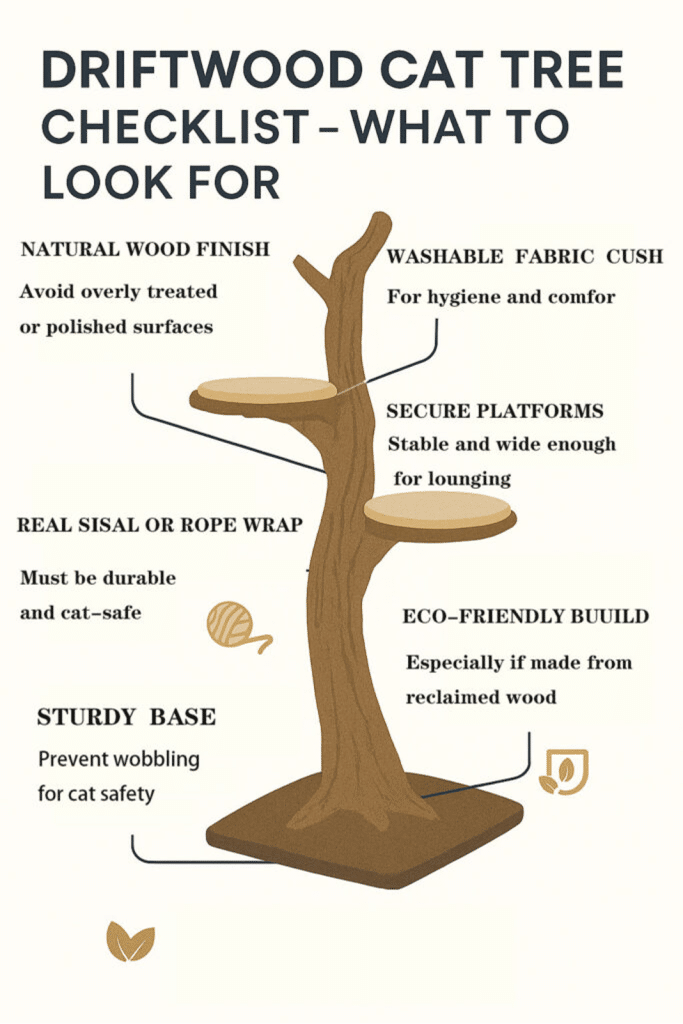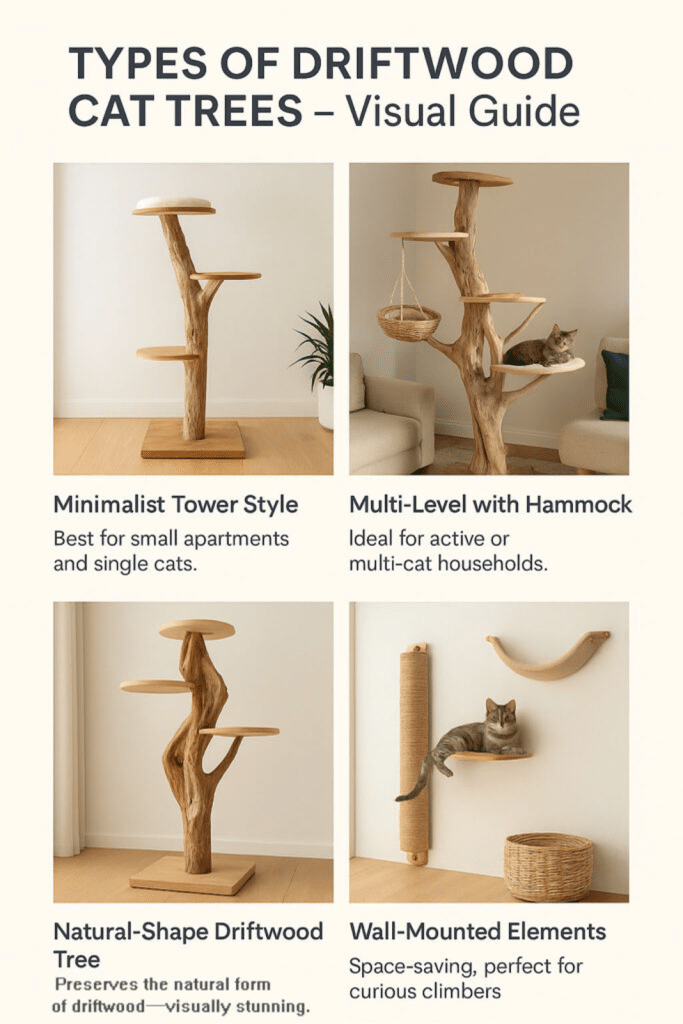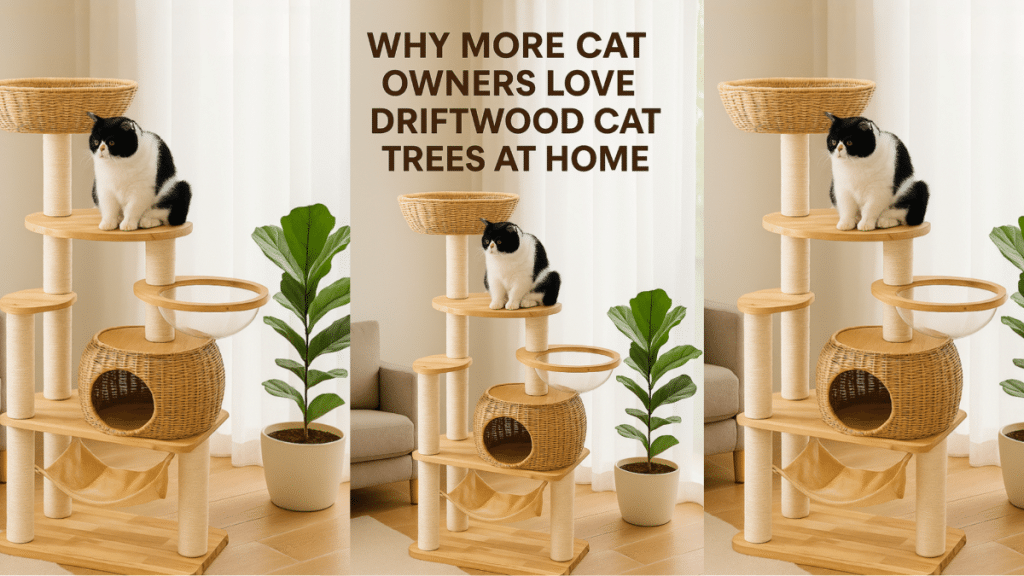If you’ve ever felt that your cat tree clashes with your home decor, you’re not alone. Today’s cat owners want more than just functionality—they’re looking for pieces that fit their interior style, respect their pets’ instincts, and stand the test of time. That’s where driftwood cat trees come in.
Unlike bulky carpet-covered towers or flat-pack furniture alternatives, a driftwood cat tree offers something unique: a blend of nature, beauty, and feline utility. Whether handcrafted or store-bought, this growing trend is turning ordinary homes into cozy cat sanctuaries.
Here’s what makes driftwood cat trees so popular—and how to choose the right one for your space and your cat.
What Is a Driftwood Cat Tree, Exactly?
A driftwood cat tree, or arbre à chat bois flotté, is a type of cat tower constructed primarily from natural driftwood. This material, smoothed and weathered by water over time, gives each piece a unique, sculptural quality. It’s often paired with minimalist platforms, sisal-wrapped posts, or plush hammocks to form a structure cats can climb, scratch, and nap on.
What sets it apart from regular cat trees is its organic look and feel. While traditional towers often prioritize function over form, driftwood models are designed with equal attention to aesthetics. Many resemble pieces of art or bespoke furniture, making them ideal for living rooms, studios, or design-conscious homes.
Why Driftwood Cat Trees Are Gaining Popularity
They Blend Seamlessly into Modern Interiors
Scandinavian, rustic-chic, Japandi, or French country—no matter your home style, driftwood cat trees often complement rather than disrupt your design. Neutral tones, raw wood textures, and soft fabric additions make them a natural fit.
Many cat owners say their guests don’t even realize the driftwood structure in the corner is a cat tree until the feline jumps up.
They’re Built for the Way Cats Actually Behave
Cats are climbers and scratchers by nature. Driftwood, with its uneven shapes and natural bark (when untreated), offers satisfying textures and vertical exploration. Unlike fabric-covered towers that wear out quickly, a solid driftwood frame holds up to daily use without losing stability.
Some models include multi-level perches, nesting cubes, and dangling toys—great for both lazy loungers and curious climbers.
They’re Instagram-Ready
Let’s face it: We live in a visual world. Whether you’re showing off your home online or snapping cute cat pics, driftwood cat trees make a beautiful backdrop. Paired with houseplants or warm lighting, they become part of the room’s charm.
How to Choose a Quality Arbre à Chat Bois Flotté

Just because it’s made of driftwood doesn’t mean it’s well made. Here are the essentials to consider when shopping for a cat tree that’s both stylish and safe:
A Stable Base
Look for thick wooden or compressed board bases—especially if you have larger cats or multiple pets. A top-heavy tree can be a tipping hazard.
Smooth, Sanded Wood
Check that the driftwood is treated (but not chemically varnished) to avoid splinters or jagged edges. Each branch should be solid, without visible cracks.
Cat-Friendly Features
Scratching posts, platforms, and hideouts should be at the right height and spacing for your cat’s size. Bonus points for removable and washable cushions.
Secure Joinery
Nails or screws should not be exposed on climbing surfaces. Ask if the structure uses brackets or concealed bolts for stronger support.
If you’re wondering what material is best for a safe and natural-looking cat tree, especially for homes that value eco-friendly décor, we recommend starting with driftwood.
Click here to learn more about why arbre à chat bois flotté is a top choice for style-conscious cat owners.
Buying vs. DIY Cat Trees: Which Path Is Right for You?
Some cat lovers swear by crafting their own trees, especially if they enjoy woodworking or have specific space needs. Others prefer the reliability and polish of ready-made models. Here’s how to choose your path:
Buying a Driftwood Cat Tree
Pros:
- Fast and convenient — set up within an hour.
- Professionally tested for weight balance and pet safety.
- Designed to match modern interiors.
- Comes with features like plush beds, sisal ropes, or built-in hideouts.
Cons:
- Higher upfront cost (but often worth it in durability).
- May not fit odd spaces or color schemes exactly.
- Assembly still required in many cases.
Want a professionally crafted arbre à chat that fits both your cat’s needs and your home’s aesthetic?
Click here to explore curated options at chezchat.fr — where design meets feline comfort.
Building One Yourself
Pros:
- Fully customizable to your space, materials, and cat preferences.
- Can be a rewarding DIY project.
- Great if you have leftover wood or live near driftwood sources.
Cons:
- Requires tools (drill, saw, screws) and some building skill.
- Safety risks if improperly built.
- Time-intensive — can take a full weekend or longer.
Want to give it a shot? Follow this detailed tutorial on how to fabriquer un arbre à chat and build a functional, beautiful tree with your own hands.

Caring for Your Driftwood Cat Tree: Tips for Long-Term Use
A driftwood cat tree isn’t just a stylish accessory—it’s a functional habitat your cat interacts with daily. To keep it looking great and lasting for years, a bit of regular care goes a long way. Here’s how to maintain both its beauty and structural integrity:
Clean Surfaces Gently but Consistently
Use a damp microfiber cloth to wipe down wooden surfaces every 1–2 weeks. Avoid harsh cleaners or bleach, as driftwood is porous and can absorb chemicals. For platforms with cushions or fabric, vacuum regularly to remove fur and dander.
Rotate or Replace Scratching Areas
If your tree includes sisal rope posts, expect wear over time. Many models allow for replacement ropes or removable wraps—rotating these parts can extend the lifespan. DIY tip: tightly re-wrap with natural sisal and secure with non-toxic glue or staples.
Inspect for Wobbling or Loosened Joints
Every few months, check for signs of instability—especially if your cat jumps enthusiastically. Tighten any bolts or screws, and ensure the base remains level. If placed on hardwood or tile, consider non-slip pads underneath.
Protect the Wood from Sun & Moisture
Avoid placing your tree near direct sunlight or in damp corners. Overexposure can dry out or warp driftwood, especially if untreated. If you live in a humid area, a light coat of beeswax or natural oil (cat-safe!) can help preserve the wood’s finish.
Observe Your Cat’s Habits
Cats sometimes favor one side or platform over others. Adjust the positioning of hammocks, toys, or perches to encourage more balanced usage—this can reduce stress on certain branches and make the tree feel fresh again.
With proper care, your driftwood cat tree can remain a beautiful and functional part of your home for many years. And more importantly, it will continue to support your cat’s health, comfort, and joy—just as it was designed to do.
Final Thoughts: What Kind of Driftwood Cat Tree Suits You?
If your priority is visual harmony with your interior and your cat is medium-sized, a two-tiered design with sisal-wrapped posts and plush perches will likely meet your needs. For multi-cat homes, consider a wider base and staggered levels to reduce competition and enhance safety.
DIY might be your best bet if you’re handy and want to save on costs—just don’t skimp on stability. Otherwise, investing in a handcrafted piece not only ensures safety and comfort but also brings a touch of artistry to your home.
One thing’s for sure: Once your cat has their own driftwood tower, don’t be surprised if your sofa becomes a little less popular.
